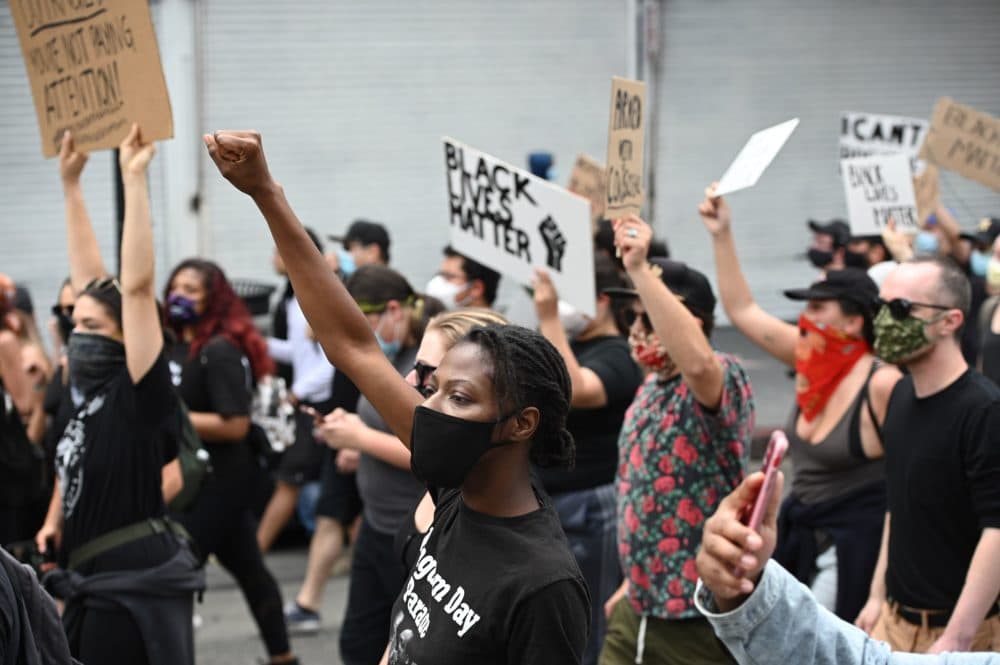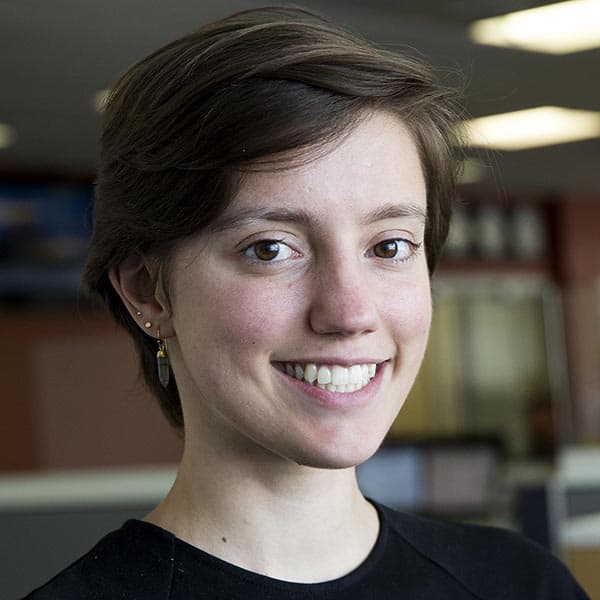Advertisement
On Point's Coronavirus Hours
'Show You Care': A Conversation With Kareem Abdul-Jabbar About Racism In America
Resume
We are seeing people 'pushed to the edge.' That’s how Kareem Abdul-Jabbar describes the protests in the Los Angeles Times this week. We speak with the former NBA star.
Guest
Kareem Abdul-Jabbar, the NBA's all-time leading scorer. Community activist. Columnist for The Guardian and The Hollywood Reporter. Author of "Becoming Kareem." (@kaj33)
Stephen Henderson, host of "Detroit Today" on WDET since 2015. Pulitzer Prize-winning journalist who worked for the Detroit Free Press, the Baltimore Sun and the Chicago Tribune. (@SHDetroit)
Interview Highlights
On his reaction to the George Floyd video
Kareem Abdul-Jabbar: “My reaction was just, ‘Oh, no.’ It was like a horror movie that's on repeat. It’s just on a loop. And it's the same horrible thing that you see. Just put a different face in the picture. Tamir Rice or Philando Castile, George Floyd. It's just one senseless death after the other. And it's horrific. It's a horrible thing to see. And I think the graphic effect of that video really pushed most people over the edge with regard to their understanding. I think after you've seen that video, you understand what black Americans have experienced for 400 years.”
"I think after you've seen that video, you understand what black Americans have experienced for 400 years.”
On the nationwide protests against police brutality
Kareem Abdul-Jabbar: “Seeing that much evil in action by someone that's sworn to protect people. And here’s a person sworn to protect people murdering someone. It's a horrible thing to see. And this is what black Americans have had to deal with time and time again. And I think a lot of people realize that no, black people were not lying about so many things. Look at what happened. Colin Kaepernick demonstrated peacefully about this exact subject. Black people being killed unnecessarily by the police. And all the hostility that he received. He was ostracized. He lost his job and was blackballed. And that was a peaceful protest. So, you know, it seemed that these things would continue to happen ad nauseum. And now finally, we see that the people of the United States get it now. And think that something should be done. And I think that that gives me hope.”
"This is what black Americans have had to deal with time and time again."
What’s different about the George Floyd protests?
Kareem Abdul-Jabbar: “I think it certainly has created room for discussions. People are talking to each other right now about this. That didn't happen before. Most people just seemed to assume that this was the way things are and went back to their normal routine. And we haven't returned to the normal routine in these past two weeks. Something different is in the air. And hopefully it will lead to real change that will enable us to contend with the issue of bad policing.”
"Something different is in the air. And hopefully it will lead to real change that will enable us to contend with the issue of bad policing.”
On his father, who was an NYPD officer
Kareem Abdul-Jabbar: “My father got hired right when more or less the city of New York decided that the manpower shortage on the police force meant that they would have to let black cops arrest white people. That's basically when he was a rookie on the force. And, you know, that's the police force that he experienced his service in. But my father received two commendations for bravery beyond the call of duty. He was an exemplary police officer. And so I know what it is when you worry about whether or not your dad's going to come home that night, that is a very valid concern for police. And we have to support and respect our police officers. The men and women in law enforcement do an incredible job. They don't get enough credit for it.”
“My father got hired right when more or less the city of New York decided that the manpower shortage on the police force meant that they would have to let black cops arrest white people."
When conversation has to translate to action, do we see evidence of that kind of momentum?
Kareem Abdul-Jabbar: “I think we have to have a specific goal. I think the specific goal should be, how do we deal with bad cops? That is central to all of this. How cops are trained and when they decide to forget their training and disrespect people's rights, we have problems. And it seems to me that there are too many police agencies that are resisting change because it makes their job more difficult. Policing is a tough job. And I think that's something that they are going to have to come to terms with. The lack of respect that occurs with these deaths ... is a common aspect of all of these problems. And, you know, something has to be done about it.”
"How do we deal with bad cops? That is central to all of this."
What is the team talk that you want American leaders to give to this country right now?
Kareem Abdul-Jabbar: “I saw a sign that was being displayed by a protester, and to me, it kind of typified what I feel and what all Americans should take into their hearts. It said that not all blacks are criminals, not all whites are racist. Not all cops are bad. And that ignorance comes in all colors. So if we can understand those facts and react sensibly and come together as a nation, we're going to do something incredible on the heels of all of this. That's what I'm hoping for. I'm hoping that we will have another coming together. And that's what I'm praying for.”
From The Reading List
Los Angeles Times: "Don’t understand the George Floyd protests? What you’re seeing is people pushed to the edge." — "What was your first reaction when you saw the video of the white cop kneeling on George Floyd’s neck while Floyd croaked, 'I can’t breathe'?"
Hollywood Reporter: "Kareem Abdul-Jabbar: The Perils of Hollywood’s Reckless Social Media Posts" — "In times of crises, fame can be a valuable platform for mobilization and inspiration, but COVID-19 has rewritten the rules, and too many famous faces need to stop and think before they post."
Los Angeles Times: "Kareem Abdul-Jabbar speaks with Lakers about George Floyd’s death" — "The Lakers held a Zoom conference on Tuesday with players, coaches and some executives to discuss the ongoing protests and civil unrest in the aftermath of George Floyd’s death, according to people who were not authorized to speak publicly on the matter."
CBS News: "Kareem Abdul-Jabbar on racism in America: 'Nothing has changed' in 30 years since Rodney King" — "Responding to the nationwide protests sparked by the death in police custody of George Floyd in Minneapolis last Monday, former NBA star and social and political activist Kareem Abdul-Jabbar said that racism in America needs to be addressed by all Americans."
The Guardian: "If I were Donald Trump's speechwriter, this is the team talk I would suggest" — "There’s a moment near the end of most sports movies when the coach gives a heartfelt pep talk right before the crucial game."
This program aired on June 4, 2020.

